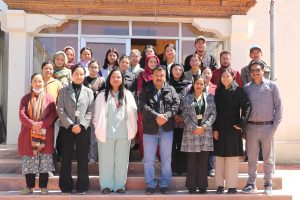The Additional Deputy Commissioner, Leh, Ghulam Mohd (JKAS) inaugurated a two days in person training for the Women Helpline functionaries at the Conference Hall, DC Office, Leh.

The Additional Deputy Commissioner, Leh, Ghulam Mohd (JKAS) inaugurated a two days in person training for the Women Helpline functionaries on 10th and 11th September 2025 at the Conference Hall, DC Office, Leh.
The Department of Social and Tribal Welfare, UT Ladakh, organised the programme with the support of the Savitribai Phule National Institute of Women and Child Development and the National Institute of Mental Health and Neurosciences (NIMHANS). The training aims to strengthen the capacities of frontline workers in providing effective, empathetic, and timely support to women in distress.
In his inaugural address, ADC Ghulam Mohd highlighted the importance of women’s empowerment for social and economic development. He encouraged women to take maximum benefit from various government welfare schemes and suggested linking a designated police officer directly with the Women Helpline to ensure swift response in cases of violence and abuse.
Ms. Sonali Kumari, Assistant Director, Savitribai Phule National Institute of Women and Child Development, Regional Centre, Mohali, introduced Mission Shakti, calling it a mission of hope, help, and change. She outlined the objectives of the training and highlighted the need to build professional skills among helpline functionaries so that survivors receive timely and compassionate assistance.
Day 1 technical sessions were led by Dr. Kimneihat Vaiphei, Associate Professor, Department of Psychiatric Social Work, NIMHANS, and Ms. Rigzen Angmo, PhD Scholar, Department of Psychiatric Social Work, NIMHANS. Their sessions focused on basic counselling skills, effective communication, and mental health awareness. Participants were trained in active listening, maintaining confidentiality, building trust, and responding sensitively to survivors of domestic violence. The sessions also addressed the psychological impact of trauma, with detailed discussions on anxiety, depression, and stress management.
Key frameworks introduced during the training included the LIVES Model (Listen, Inquire, Validate, Ensure Safety, and Social Support) and the 4 Fs of Fear and Stress (Fight, Flight, Freeze, Fawn). These frameworks equipped participants with practical tools to understand and respond effectively to survivors’ emotional reactions. Interactive activities and role plays were also conducted to provide hands-on experience in handling sensitive cases with empathy and professionalism.
The training will continue on Day 2 with advanced modules and practical demonstrations aimed at further strengthening the Women Helpline’s capacity to deliver proactive, empathetic, and effective services across Ladakh.
Participants included representatives from the One Stop Centre (OSC), Women Helpline (WHL), Hub for Empowerment of women, National Institute of Mental Health and Neurosciences (NIMHANS), and Savitribai Phule National Institute of Women and Child Development. Their active involvement reflected a shared commitment to building a stronger support system for women in Ladakh, ensuring that timely help and compassionate care reach every survivor in need


